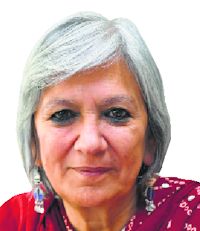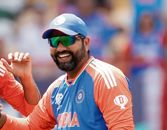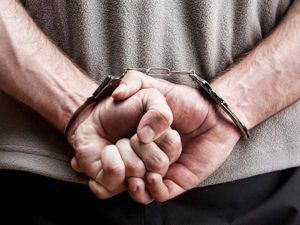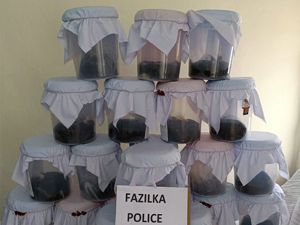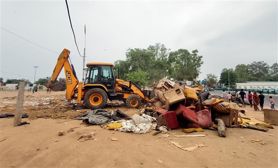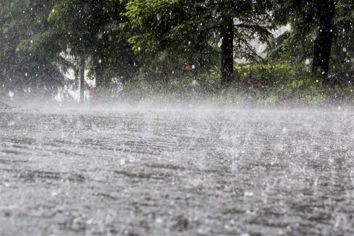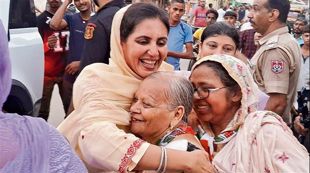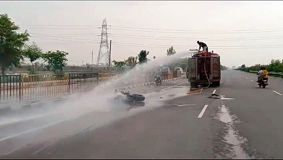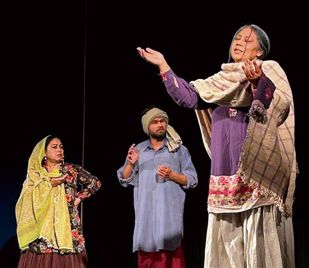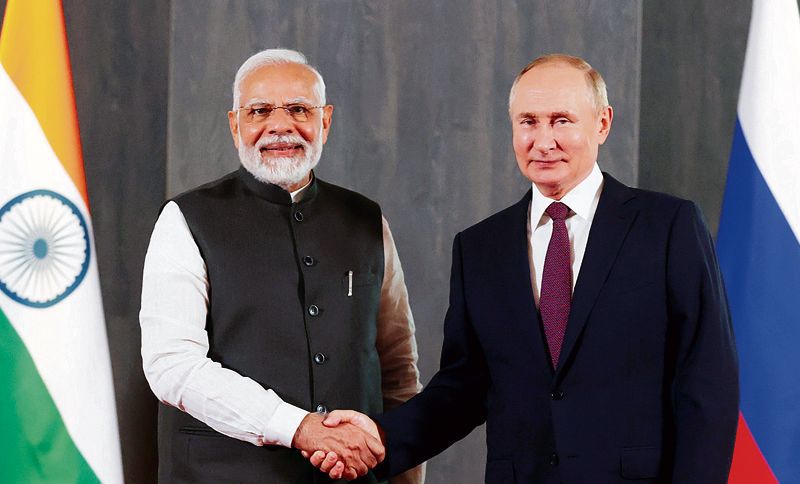
A fine balance: Limiting PM Modi’s Moscow trip to one day is, perhaps, a good compromise — India doesn’t want to antagonise the Americans too much. ANI
OUTSIDE the wraparound glass wall of my hotel room in Moscow, the Moskva river shimmers in the morning sun; the gorgeous, Stalin-era Ukraina hotel across the river is lit up like a fairytale castle at night, while the bridge over the river, Kuznetsky Most, is a memory trigger to those dark days in October 1993 when Russian tanks parked themselves on the bridge and trained their guns at their own Parliament nearby, a building also known as the White House.
Putin is winning at home because he has successfully framed the Ukraine war in terms people understand.
Rub your eyes, again, and the White House leaps up next door, now shinily painted in white-and-gold. Elsewhere, too, the city is both spick and span. You would never guess that there’s a new crisis in town, although missing hoardings to Western goods like Mercedes-Benz cars, McDonald’s burgers and Maxim’s pastries superficially give the game away. So much has changed since Russia’s war in Ukraine began just over two years ago, but what is remarkable is that Moscow is not just far more affluent than it was during the chaos of the 1990s; it is also far more resilient and united.
Nor is it anyone’s case, however, as Prime Minister Modi travels to Moscow for a day-long summit with Russian President Vladimir Putin a week or so from now, that the war hasn’t affected people. Anti-war sentiment is significant, if subdued. The fact that Ukrainians and Russians share many important things — including the Orthodox Church, Slav ethnicity, marriage and family ties, which basically mean they are part of one, large cross-border family — makes one wonder if the thousands of people still dying on both sides are worth the cause they claim to be fighting for.
Probably not. Few ideas are worth a bullet inside your body. The truth is that the battle for Ukraine is no longer just a fight between Ukrainians and Russians, but a proxy for someone else’s argument. Right from the start in February 2022, the Ukrainians never had the sophisticated weaponry to fight the Russians — Putin probably thought he would walk all over Ukraine within days, declare victory and move on.
It hasn’t quite worked out like that because the West is getting more and more deeply involved. For the past two years, the US has continued to supply Ukraine sophisticated weaponry to fight the Russians. In the past year, US-made drones have launched attacks deep within Russia, even reaching the outskirts of Moscow. Western mercenaries of more than one NATO country — the US, Canada, the UK, France, Poland and Romania — have been fighting alongside Ukrainian soldiers. Clearly, it’s too soon after Afghanistan to put American boots on the ground, but NATO mercenaries are also obviously operating the more sophisticated weaponry that Ukrainians may not be able to.
It is in the middle of this chaotic situation that PM Modi is going to Moscow. Western diplomats are already wondering why he wants to embrace the Russian leader at a time like this — especially when US National Security Adviser Jake Sullivan was in Delhi less than a fortnight ago to promise the transfer of critical technologies, a gesture India has widely appreciated.
On the other hand, India-Russia trade has zoomed from a mere $10 billion before the Ukraine war to around $70 billion today, primarily because of the large quantities of oil India is buying from Russia, refining it at a smallish profit and re-exporting the refined product to European refineries — the Europeans, as we know by now, have been sanctioned from trading with Russia since the start of the war, which is what explains the missing hoardings on Moscow’s streets.
Certainly, Russia’s cheap, discounted oil has helped India minimise the damage to its own economy, especially as India came off the Covid pandemic. Imagine the impact on the elections, especially on the ruling BJP, if oil prices had gone through the roof — for a price-sensitive country which imports more than 80 per cent of its energy, stabilising the domestic oil market would have taken much dexterity.
Certainly, Modi is keenly aware that his visit to Moscow will be keenly watched all around. Limiting his trip to one day is, perhaps, a good compromise — India doesn’t want to antagonise the Americans too much; the US remains a hugely powerful nation, leverages a significant diaspora that substantially supports Modi and remains the largest source of FDI.
But the big change in Russia compared to the deep, national crisis it underwent in the 1990s is that today’s Russians are no longer shying away from asserting themselves as a big power — in the aftermath of the disintegration of the Soviet Union, then President Boris Yeltsin had joined hands with the West in the hope that Russia would be accepted as an equal partner; all it got was the public humiliation associated with being told it was a second-rate power.
At the Primakov Readings think-tank dialogue in Moscow earlier this week — in which I was a participant — the irony was that not one Western scholar physically showed up for fear of being sanctioned by their own organisation back home, but only participated online; everyone else, including Russians, debated everything from culture to the possible use of tactical nuclear weapons in the Ukraine war.
Understand, then, why Putin was elected for the fifth time this March, although he’s been in the top job for more than 20 years. Putin has effectively erased those memories of the 1990s by leveraging Russia’s vast mineral resources to maintain a certain level of affluence, kept pensions for the elderly and poor, sacked corrupt ministers and invited nations like China and India to replace Western companies which have left after the Ukraine war; in reality, most have not left but simply rebranded themselves as Russian companies because the Russian market is so tempting. Putin is winning at home because he has successfully framed the Ukraine war in terms people understand — that the West is fighting on behalf of Ukraine and wants to keep Russia down.
So, what is the moral of the story for India as Modi prepares to travel to Moscow? Most importantly, India must continue to straddle the Middle Path as it has always done, since the time of the Buddha, bending neither left nor right. Biden, Trump or Putin, India must listen to them all and welcome them — remember, they only add to the panoply of alternatives with which India can be built for its own better tomorrow.
Join Whatsapp Channel of The Tribune for latest updates.






